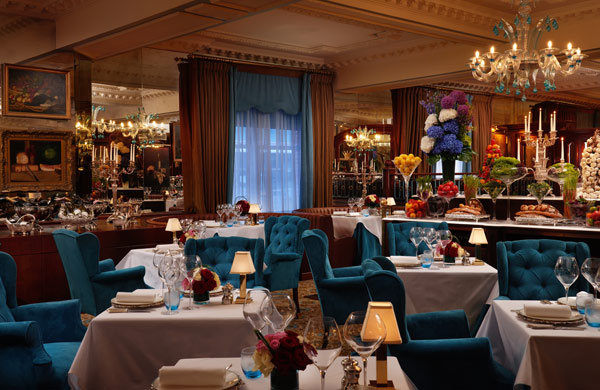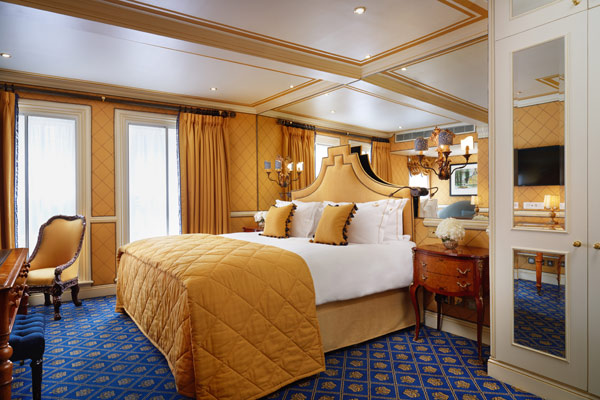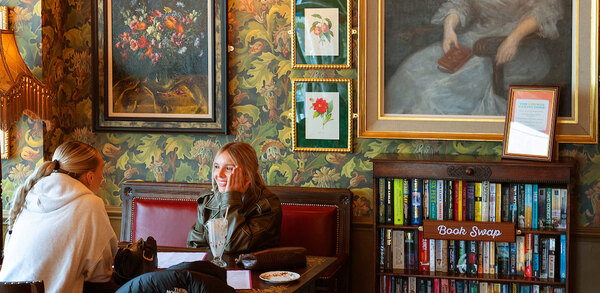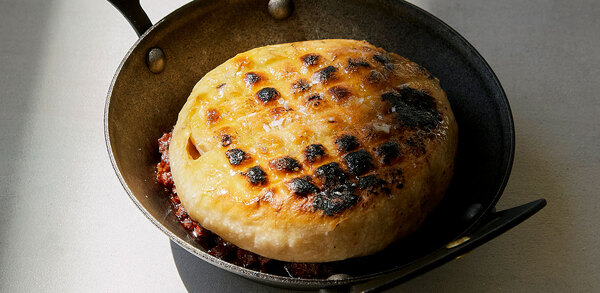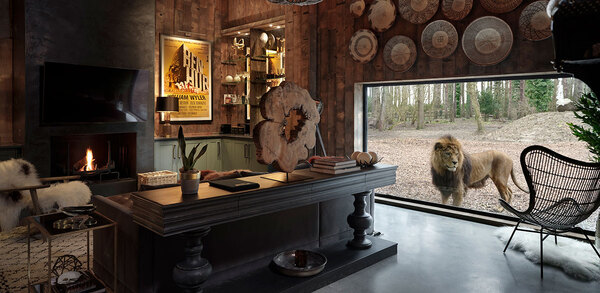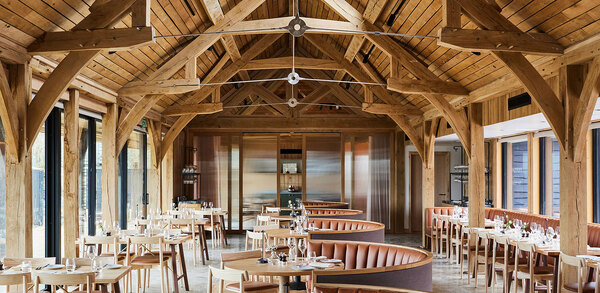The Caterer interview: Jonathan Raggett
Having just overseen a multimillion-pound refurbishment of the Rubens at the Palace, where he started his Red Carnation career as general manager nearly 20 years ago, Jonathan Raggett, now group managing director, talks to Katherine Price about repositioning the hotel, topping the TripAdvisor charts and beating Brexit
We are a group but weâre also very individual, and itâs about what fits that particular hotel. It was very much the idea of our president and founder Beatrice Tollman to give a royal theme to everything, due to the propertyâs proximity to Buckingham Palace.
Weâre not sexy or cutting-edge. We stay up with technology in every single way, but we know what we are: we are very traditional, we do things very well, we donât cut corners and we spend a lot of time developing our people.
Weâve also got an incredible English Grill, the Curry Room, and the Bbar for burgers and salads. At the moment the English Grill serves more residents than outsiders. Weâll build that up as we go forward.
How do you see the adjacent new Nova development, which has brought a lot of bars, restaurants, offices and residences to the area?
It was noisy with all the building work, drilling at five in the morning â" itâs a whole story of its own of refunds and apologies. Malcolm [Hendry, Rubens general manager] used to go out there at five in the morning with croissants and coffee and beg them not to start for two hours.
There were some very tough and miserable days, but it had to be done, and weâre very pleased with Victoria now. It will be interesting to see where Nova goes over the next year or two. There are some sites that arenât busy enough. Itâs going to take time for Victoria to become a place where people will go out.
What are the plans for the Rubens?
Weâre looking for a room rate increase of £50 now all the works are finished; we have a totally different product to where we were. Weâre shooting for the stars. We understand weâre going to have to give up some occupancy for it, but we are repositioning the Rubens and believe we have the product, the location and the service to push on for that.
Weâve got a minimum rate now of £204.30. In the past weâd bring our rates down a bit lower and try and fill the hotel, but you canât run a hotel like this with a much higher payroll and sell it at the same rates.
Will the repositioning appeal more to corporate or leisure travellers?
Weâve lost a fair bit of corporate business because a lot of businesses have procurement managers now who just want the very lowest rates. And thatâs fine. We believe we can get more high-end leisure â" there isnât a hotel closer to Buckingham Palace than this.
Does the Rubens appeal to millennials?
Everybodyâs after a younger audience for the obvious reason theyâll be here longer. There are millennials who like what we do. In truth, we probably appeal to people of 40 and above, but what weâve done is timeless. A lot of the new chic, minimalistic-type hotels are quite âtodayâ, but are they going to be around in a few yearsâ time?
Instead, I have sleepless nights making sure I keep up with technology. Millennials donât necessarily want to engage with people â" theyâd rather phone or use iPads. Weâre absolutely on that so that you donât have to speak to anyone if you donât want to. Weâre very much keeping up with the latest technology.
Red Carnation hotels have topped TripAdvisorâs London hotel rankings for years. How do you do so well in social media?
If somebody says, âIâve had an amazing stay, I canât thank you enough,â we say you can thank us enough â" tell a million people! If people tell my staff theyâd like to write to me and tell me how great the hotel is, the team say thatâs really great, but I read all user-generated content, and putting it online would be even better.
We also get lots of people asking us to take a photograph of them and we ask them to hashtag it for us. And weâve taught our frontline staff how to take a good picture. Itâs important, because if I take a picture and you donât like it, youâre not going to share it. Weâve seen the correlation of more pictures being posted.
Have TripAdvisor bookings proved a source of revenue for you?
Itâs a huge boost. It isnât the only one, there are a lot of online travel agents. Youâre wrong as a hotelier to use just one or two â" there are over 70, so we use a company called ReviewPro, which aggregates it all. And managers get alerts, so if somebody writes something bad, youâre onto it straightaway. I donât think in todayâs world you can just let bad reviews sit there, you have to get onto them. If a hotel is high up on TripAdvisor, people ignore all the good stuff and are only looking out for the negative; thatâs where itâs then important that youâre answering it right.
What do you think about the recent issues hoteliers and restaurateurs have had with guests threatening bad reviews to get deposits and cancellation fees waived?
People know that they now have a lot of power in their voice. I donât want to appear weak and soft, but youâve got to be on the guestâs side. What we would do is try and negotiate a stay at a later date. You want to keep that between you and the customer.
When people do complain, smoke and fire comes to mind: youâve normally done something [wrong]. If you mess up, deal with it. Donât necessarily just give the money back, but listen. If people believe theyâre being listened to, that youâre going to correct it, they come back, and perhaps we give an upgrade or something extra. The cost to us is minimal, but the perceived value is much greater to the guest. You keep their loyalty and you keep them coming back to your hotel or restaurant rather than the many thousand others in this town.
Your vice-president of human resources Liz McGivern won HR manager of the year at the 2009 Hotel Cateys. What are you continuing to do to retain and attract staff?
We have what we call AIM 1 â" an ambassador and management course where we take 15 bright young staff members who have been working in a supervisory-type position, all trying to get on. I go through with them how we can do better and the challenges, they learn some skill sets, and the cohorts all get to know one another. The AIM 2 is a bit more managerial so they understand the back of house, the balance sheets and the cashflows.
Have you lost any staff since the Brexit vote?
We have lost about 30 people in our London hotels. Liz McGivern used to get about 1,000 CVs from Europe a week â" weâre down to about 50 a week now.
We used to have four students come over from a college in Italy. Four months after the vote they said they wonât be sending us their four students in January because the students donât want to come and their parents donât want them to come, so theyâre going to send them to Paris instead.
Iâve got 1,000 staff in London; Iâll always find 1,000 staff because Iâll make sure we attract 1,000 people. The real issue is when it comes to housekeeping and back of house. I can put an advert anywhere I want, but British passport-holders do not apply for those jobs. Itâs huge for this business â" no one knows where itâs going.
Iâm not sure how weâre going to get waiters to come to this country. I guess there will be a visa-type system, but then you might as well go to Paris or Milan. Thereâs no good moaning, the decision has been taken by the British public that they want Brexit. I respect democracy. But Iâm a fighter. I will ensure that we have the very best people working in our organisation.
You were front of house manager at the Highcliff hotel in Bournemouth in 1985, which hosted the Conservative conference the year after the party was targeted by the bombing of the Grand hotel in Brighton. Do you tap into the knowledge you gained from that experience to ensure your guests and staff remain safe in todayâs climate?
The security of the people who work in our hotels and our guests is paramount. We have very strict policies on the times we lock our doors in the evenings and the security of back of house entrances. The reality is that hotels are very soft targets, but I am strict with managers that cupboards are locked and we do all we possibly can. As much as I boast of being proud to be next to the palace, it makes you very vulnerable. We take security very, very seriously.
We also do personal awareness training with staff about what to do when they leave the hotel after a night shift. We teach them to take out their earphones and tuck their phones away, and we get taxis for our staff after about 11pm.
Do you plan to acquire any more properties?
Weâre always looking at places that are a bit distressed where we can add value in terms of refurbishment and the people side. We wouldnât buy a property we felt we couldnât ourselves improve on. If the opportunity came up, almost anywhere, we would be interested.
What is the future of Red Carnation?
Youâve got to have vision and strategy but if you get too far ahead you forget what the reality is, which is today. Red Carnation is very much about continuing to develop its people, to make sure everything is as perfect as it can be within the hotels, listening to our guests, maintaining all we do have. But weâre never complacent. We celebrate our awards for five minutes and then weâre back on it â" we push on.
Videos from The Caterer archives



